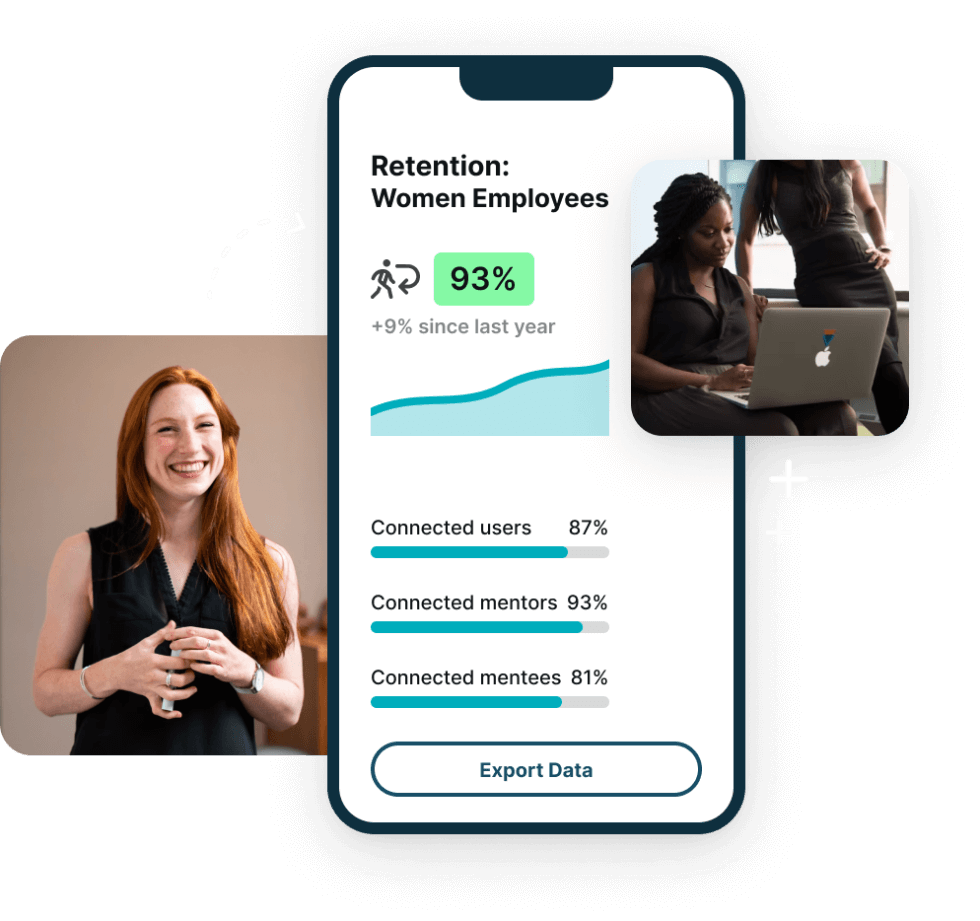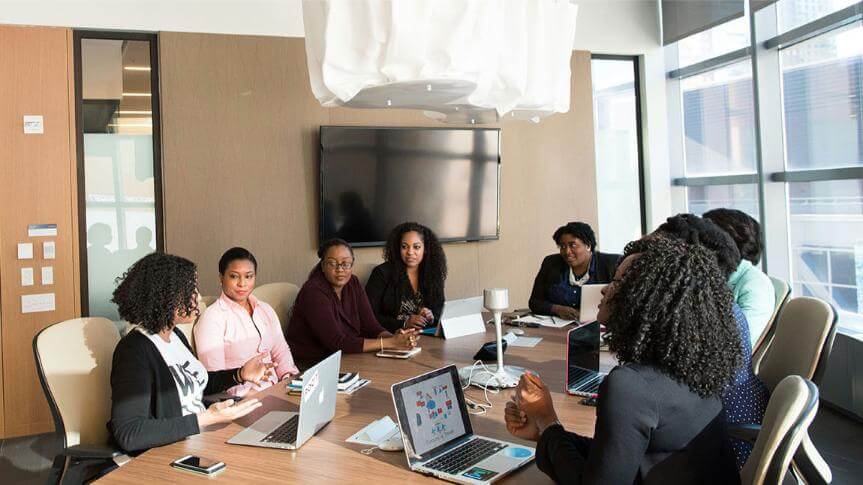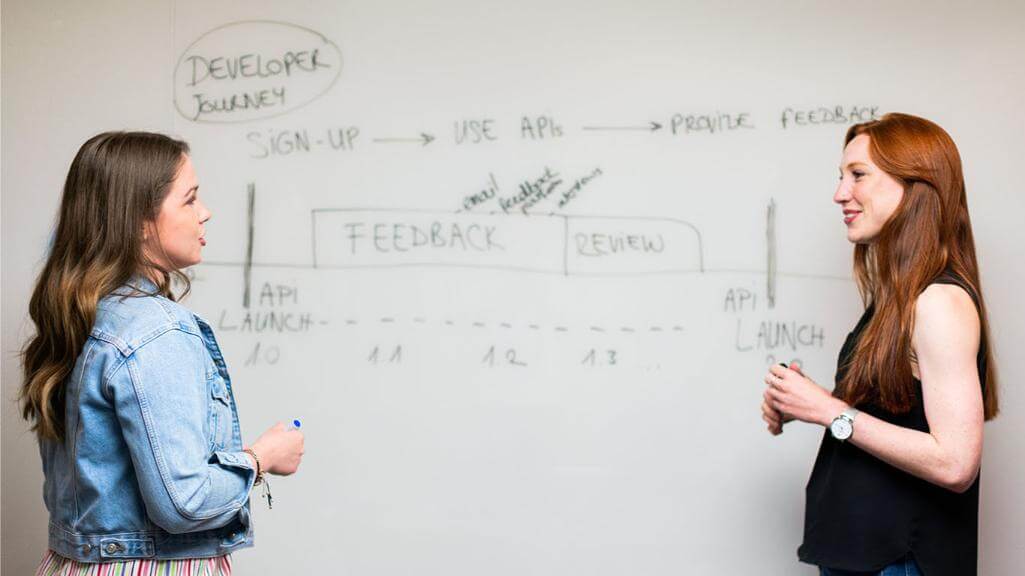🏆 How HCLTech Scaled Upskilling & Increased Retention 15% with Mentoring Read Case Study
Workplace Mentoring Programs for Women

In a world where empowering and retaining female talent is increasingly paramount to a company’s success, mentorship serves as a key component. When we look at the landscape of today’s workforce, it’s evident that a gender-inclusive, equitable and diverse environment is crucial not just as a social responsibility but also as a significant business driver.
Mentoring women in the workplace is not just about fostering individual growth—it’s a strategic investment that yields significant returns for both the mentors and mentees, as well as and the company at large.
Download Emboldening Women in the Workplace
Why are Women’s Mentorship Programs Important?
Mentorship programs for women have been widely recognized as a vital component of most successful diversity, equity, inclusion and belonging (DEIB) strategies. These programs support women to thrive in the workplace, especially in traditionally male-dominated environments or industries, offering guidance, sponsorship and networks to navigate and accelerate their career paths effectively.
Mentorship programs can help women employees and organizations in the long run in the following ways:
- Increases promotions: A study conducted by Harvard Business Review shows that women who found their mentors through formal programs received more promotions versus women who had found mentors on their own.
- Creates larger mentor pools: As mentored women move up the ranks, they, in turn, become mentors, creating a virtuous cycle that fosters continuous learning and development.
- Attracts and retains female talent: mentoring fosters a culture of support and recognition, attracting top female talent and bolstering the company’s reputation and talent pipeline.
- Improves employee satisfaction: Women who feel supported in their employee journey with career mentoring are more likely to stay with their employers, leading to reduced turnover—a clear win for the company’s financials and a testament to the program’s success.
- Builds better succession plans: Mentor programs ensure a pipeline of well-prepared women leaders, which is critical to business continuity.
The Imperative for Formal Mentoring Programs
Even in modern corporate spheres, where DEIB is sparking intense conversations, there remains a palpable dearth regarding the representation of women in leadership. While multipronged approaches are crafted to bridge this divide, mentoring is positioned as a critical lever.
Formal mentorship enhances the visibility of potential female leaders, providing them with networks, guidance and opportunities that would otherwise remain elusive. It also sends a strong signal that an organization cares about its female employees, actively providing opportunities for growth and advancement.
Addressing the Mentorship Gap
In many cases, early off-ramps in the career trajectory of women are attributed to limited access to influential guidance. The elusive ‘boys’ club’ has traditionally mirrored the upper echelons of corporate ladders, effectively isolating women from impactful networks.
Informal mentoring has often felt as if it’s not for women or not actively seeking women, leaving them on the outside of these ‘happening by chance’ relationships.
Fostering Inclusive Behaviors
Mentoring women is not merely an exercise to boost DEIB scores. It is a directive to the core of a company’s culture, signaling a commitment to see women advance in their career endeavors while creating inclusive behaviors in the workplace.
As mentors and mentees interact, it fosters cultural transformation — one where value is measured by an individual’s talent, ambition and potential.
Get the eBook Now
Download the Free eBook to Take on the Go

Benefits of Implementing a Women’s Mentoring Program
When companies mentor women in the workplace, it can pay off in dividends, benefiting the company and top business objectives. Here’s how:
Greater Productivity and Company Revenue
Research by McKinsey & Company showcased companies in the “top quartile for gender diversity are 15% more likely to have financial returns above their respective national industry medians.” Thus, companies can leverage this positive correlation to their benefit by creating a fulfilling work environment for women through mentorship opportunities.
Accelerates DEIB Goals
One of the immediate impacts of effective women mentoring programs is the acceleration of a company’s DEIB initiatives. By mentoring women regarding their career growth, companies visibly demonstrate that they are invested in the success of their female employees, fostering a culture of inclusion and belonging.
One study found that using mentorship programs improved the diversity of representation in managerial positions by 9% to 24% (especially for Black, Hispanic, and Asian women). Minority female employees women have the opportunity to advance in their careers with the focus on gaining new skills and building professional connections through company-led mentorship programs.
Software can drive 50% increased engagement. Learn how.
How Do Female Employees Benefit
from Workplace Mentoring?
Female employees gain several benefits when a company implements a formal mentorship program, including the following:
1. Improves Productivity
Mentorship streamlines the knowledge acquisition and cultural integration for new female employees. Through their mentors, mentees can gain knowledge and skills to do their role more competently and efficiently, improving productivity and ultimately impacting key business initiatives. Also, mentorship programs help establish mentoring goals to track and manage a mentee’s growth while they develop new skills and knowledge.
2. Speeds Cultural Acclimation
Women who are introduced to mentors at the onset of their employment can learn the intricacies of their role and the company culture more efficiently. This is especially crucial in fast-paced industries where slow acclimatization could impede the momentum of the newbie employee. Instead of navigating career puzzles independently, a female mentee’s learning curve is significantly easier, courtesy of their mentors’ insights.
3. Develops New Skills
Mentorship plans are a linchpin of organizational support, mainly regarding skill development. This support can be transformational for women who have historically faced greater challenges in upskilling. For instance, a mentor might encourage their mentee to tackle speaking opportunities, nurturing softer skills like public relations, which can be pivotal in a professional life.
4. Create More Women Leaders
When women actively engage in a mentor-mentee relationship, they are more likely to feel engaged with their work — a critical precursor to career advancement. Additionally, mentors have a unique role in helping female employees identify and bridge skill gaps that could lead to career growth.
For example, once a mentee identifies their professional goals, their mentor can help connect them to a broader professional network of people who can propel their career.
5. Creates Networks and Connectivity
Isolation can sometimes be an inadvertent outcome of deeply ingrained social structures for women in the workplace. Mentor programs can mitigate this isolation, introducing them to colleagues and initiating new relationships. A mentor guides and introduces their mentee to other professionals, creating a ripple effect of expanding professional circles.
Why It’s Important for Women to Mentor Women
These types of relationships foster a supportive environment where women can share their unique experiences, challenges and strategies for success. Female mentors serve as relatable role models, offering guidance on overcoming gender-specific barriers such as workplace bias, work-life balance, and imposter syndrome.
By mentoring other women, they can help build confidence, provide opportunities for career advancement, and encourage empowerment in industries or positions where women may be underrepresented.
4 Types of Mentoring Programs for Women
Mentoring women can take a variety of forms, each with its own unique advantages. Let’s explore four popular options:
Mentoring Circles for Connection
Mentoring circles, or group mentorship, are advantageous for women in the workplace as they provide a platform for mutual support and shared learning. By connecting with peers, women can discuss the unique challenges they face in the workplace and exchange strategies for personal and professional growth. This approach can also foster a stronger sense of community and belonging, important factors in retaining talent.
High Potential Mentoring for Women Leaders
High-potential mentoring is geared toward women who have displayed exceptional promise for leadership positions. These programs often focus on networking with other women in leadership positions and can significantly expedite women’s climb up the corporate ladder.
By equipping women with the necessary skills and insights to obtain and thrive in leadership roles, organizations can ensure that they are not squandering valuable leadership talent due to systemic barriers.
Buddy Programs for Company Integration
Buddy programs are commonly used during the onboarding process, but they can also be especially beneficial for women as they integrate into a new company or team. These partner new hires with seasoned employees who can help them navigate office politics, procedures and culture. This can be particularly effective for women initially stressed by the intake of a new workplace or the expectations of a new position.
Minimizing stress and burnout during the onboarding process is crucial for employee retention, and buddy programs can play a pivotal role in this regard. They also reduce the administrative burden of individually training new employees, which is an efficiency win for the organization.
Reverse Mentoring for DEIB Initiatives
Reverse mentoring flips the traditional mentor-mentee hierarchy, with junior employees mentoring more senior staff. In the context of DEIB, this approach is powerful because it fosters cross-organizational networks and connections that might not otherwise form.
For example, junior female employees can share their insights and experiences of the organizational culture, giving senior leaders a boots-on-the-ground understanding of the company’s DEIB challenges and successes. This bottom-up approach can transform leadership teams eager to engage with their DEIB goals.
Increase retention by 20% with Chronus mentoring software.
Case Study: Paychex Increases Female Employee Retention

Paychex, an HR benefits and solution platform, has an employee population comprised of 60% women. In order to build a better pipeline for women talent, they wanted to implement a career mentoring program for high-potential women leaders.
After two years of working with Chronus, Paychex saw a 94% retention rate with its women mentoring program participants, 14% higher than the employees who didn’t participate in mentoring. Chronus provided a configurable platform to power the organization’s needs of configurable matching for their female employees.
By tracking mentoring connections in conjunction with job advancement, Paychex increased the number of female leaders.
Managing and Measuring Mentoring Success
The success of a woman mentoring program should be measured in both quantitative and qualitative terms. Quantitative (hard) data such as promotion rates, retention figures and participant feedback clearly show the program’s impact. Qualitative (soft) data, including stories of personal growth and development, also play a significant role in demonstrating the program’s success.
Quantitative Data in Mentoring: Tracking Progression
In the world of metrics, numbers tell a powerful story. The following data points can outline progress in a way that’s hard to dispute:
- Promotions
- Job changes
- Salary increases
- Retention rates
- Satisfaction rates
- Leadership representation
Among those results are key validators of a successful mentoring program. They are the outcomes that benefit the mentee and demonstrate value to the organization investing in mentoring.
Qualitative Data in Mentoring: The Personal Touch
Qualitative data plays a pivotal role when it comes to gauging the impact of mentoring relationships. This human-centric approach delves into the stories, experiences and personal growth that number metrics might overlook. Mentoring is all about the narrative. The mentee who found her confidence, the manager who saw increased engagement and the team that was more cohesive after a mentoring program—these stories are invaluable.
How do we tap into these stories? It’s about building trust—in your mentor-mentee relationships and in the data collection process. Open-ended surveys, one-on-one interviews, or focus groups can elicit narratives showing transformation, empowerment and the softer yet critical side of professional growth.
Democratizing Access to Mentoring
through Technology
Mentoring platforms have started democratizing access to mentorship by expanding the reach of programs beyond physical and geographical limitations. These solutions can disrupt traditional mentor models, making them more accessible and inclusive to a wider range of employees. With the right tools in place, mentoring can be structured, measured and scalable.
How Chronus Software Streamlines the Mentorship Process
Whether you’re a mid-size company or a global enterprise, the Chronus mentorship platform can be tailored to your organization’s unique needs. Chronus mentoring software helps design and automate a culture of learning and development, enabling women to connect with mentors who can offer tailored guidance at the right point in their employee journey.
More than just a matching service, Chronus tracks progress, suggests developmental resources and facilitates regular check-ins, ensuring that mentorship is a dynamic and impactful relationship for both parties. With the help of Chronus, enterprises can reduce administrative effort while boosting the impact of mentoring in their organization.
As the corporate landscape evolves and the spotlight on gender parity becomes ever brighter, mentoring emerges as a tool for career navigation and a champion of corporate culture transformation.
Mentoring Software Can Help
Watch the video to see how the Chronus mentoring platform makes it easy to start, manage, and measure modern mentorship programs.



